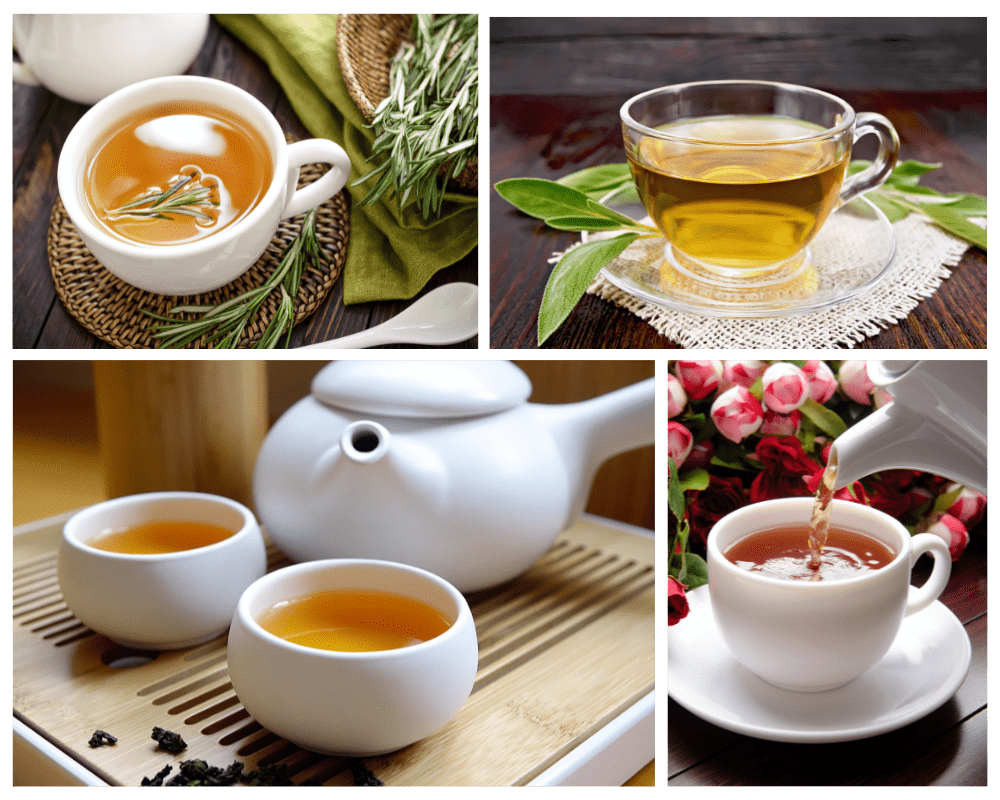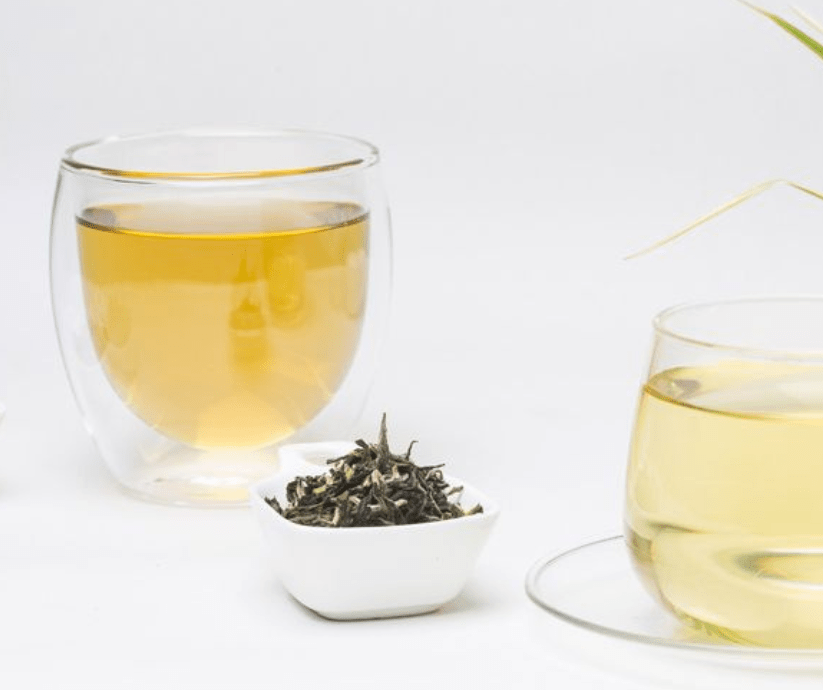Whenever the word white tea struck our hearings, the first question that comes to our mind is how much caffeine in white tea is present. Millions of hardworking people kickstart their days with a steaming-hot cup of goodness.
While a lot of people might view tea as a much less caffeine-rich habit as compared to coffee, the truth is a couple of cups can be surprisingly unhealthy.
How Much Caffeine in White Tea?
It is wise to understand the significant caffeinated differences between black, green and white tea before making your mind – switch from java to jasmine. If you are interested to know if white tea has caffeine as much as black tea, then this article will help you in this regard. Caffeine in white tea is much less than that of black and green tea. According to a recent study, an eight-ounce cup of white tea has around 15 to 30 milligrams of caffeine per eight-ounce serving, while black tea boasts a handful of 40 to 70 milligrams of caffeine per eight-ounce serving. If we take green tea into account, then there are roughly 35 to 45 mg of caffeine per eight-ounce serving.
Thus, the so-called decaffeinated tea isn’t actually caffeine-free tea.

What is White Tea: Health Benefits
Whether the tea leaf will wind up in the cup of black, green, or white tea depends upon the fermentation process after it has been plucked. It means the type of teas available in the market will depend upon the methods of different tea-making processes.
So, what is white tea, and where does it fit into the greater picture? The fine silvery-white hairs which are present on the unopened buds of tea plants are the source of white tea. Tea requires minimal processing, and the immature leaves of the tea bush are plucked quite fresh and are withered by solar drying, air drying, or mechanical drying. The health benefits of white tea vs. green tea are compared side by side to conclude the discussion. Organic white tea is much more beneficial, and there are hundreds of white tea products seen these days on store shelves. While white tea’s caffeine content is much less, it has a lot of antioxidants as well as flavonoids, polyphenols, and tannins.
- Lower the risk of cancer
- Lesser cardiovascular disorders
- Helps with weight loss
- Lower bad cholesterol
- Increase the plasma
- Repair and maintain the skin
- Protect the skin against UV light
- Slow down the aging process
- Increase insulin secretions
- Provides natural antibacterial properties
What Does White Tea Taste Like On Your Buds?
If we have to describe the taste of white tea in a word, then it would be “delicious.” To know how much caffeine is in white tea, you can compare the taste of white tea and black tea. White tea has a subtle, refined, and deliciously rounded flavor.
It is really something that you will savor as soon as you take the first sip. The subtle flavor means that you can enjoy white tea at any time of the day. However, the majority of people like to have a refreshing cup as a pick-me-up drink in the early afternoon. The buds and leaves that make the major content of white tea are picked when they are still fresh and young. Afterward, these are gently oxidized to create a healthy and clean cup of tea.
The process through which it is made gives a source of some powerful natural antioxidants. White tea is generally consumed because of its anti-aging properties. Here comes a major question, is white tea good for you? It depends on the area you are living in, your health condition, and the types of tea you are using.
The Best White Tea Varieties
White tea is available on the market in different forms varying from loose teas to beverages. To make sure that you are getting your hands on the right type of tea, let’s discuss some common types of teas that are used widely, their origin, and their benefits.

How Much Caffeine in White Tea? 8 Most Common Types of White Tea to compare are as follows:
1. Organic Loose-leaf White Tea
This is the best-in-class white tea that is crafted from the young buds and leaves of the organic tea plant. It is a light fragrant tea that can be used on any occasion. To offer full-bodied white tea, Buddha Teas are known to harvest organic and fresh leaves crafting the white tea that comes without any harmful or unnecessary chemicals.
2. Tealyra White Peony Tea
This rare yet delicious loose-leaf tea is from the Hunan Province of China and has its marks deep down in the traditions. This tea gets its unique name from an ancient tea maker who was attacked by a group of monkeys trampled upon the farmland. The man thus traveled to a far-off land to get advice and got a new recipe from Shaman for a special type of tea. The man left 100 pounds of tea in a chest, and the very next morning, all the monkeys were gone leaving the chest all empty.
For the ones who are looking for top-notch white tea straight from China, this one is their blend. It provides a delicate, smooth, and soft flavor.
3. Organic Bagged White Tea
You might be interested to know where to buy white tea, which is delicate, super delicious, and organic. This great organic tea brings a refreshing and light taste to your cup. To just say a freshly brewed mug of white tea will be like understating the taste and features but never overstating.
Some of the important nutrients of white tea are:
- A variety of B vitamin
- Vitamin A, C, K, and E
- Potassium, copper, and magnesium
- Dietary fiber
- Antioxidants
4. Silver Needle White Tea
It is considered the gold standard in the category of white teas. Being commonly produced in China’s Fujian province, it is made using silver-colored buds of about 30mm in length. It is also generally cultivated in Yunnan province and some other countries around the globe. Silver needle white tea boasts a sweet and light flavor which is popular among tea connoisseurs. Though it is named silver tea, the leaves are golden in color featuring a rich and woodsy body with a unique floral aroma.
5. Tribute Eyebrow
It is grown in the provinces of Fujian and Guangxi and is ranked as the third-highest grade of white tea. It is usually harvested later than the Silver Needle teas, and the flavor is quite bolder too. Having a fruity and strong flavor, this tea is much similar to oolong tea.
6. Darjeeling White Tea
It comes from India’s Darjeeling region which is quite famous for producing black teas too. This tea is cultivated at a high altitude of 2000 meters and contains fluffy leaves that produce an airy aroma. Darjeeling white tea is pale gold; it offers a mellow flavor with a bit of sweetness.
7. Imperial Himalayan White Tea
The Imperial Himalayan white teas are cultivated during the autumn season and are named after the Himalayan mountains which are well-known for tea plants. Republic of Tea and Vadham both offer one-of-a-kind varieties of this white tea. It is produced at high altitudes as these tend to have a stronger flavor with a blend of fruity notes.
8. Opt for Decaf White Tea
Decaffeinated white tea has undergone a process of decaffeination but can still contain some traces of caffeine in it depending upon the process. Some of the most popular teas that undergo the process are oolong tea, green tea, black tea, and white tea. Decaf tea might contain around 1 to 8 milligrams of caffeine as compared to regular ones. Decaffeinated teas are not caffeine-free, like herbal teas, jasmine or chamomile are a few to name. The uses of decaf white tea are much more than regular ones.
Origins of White Tea: Unearthing History
It was believed for many years that white tea was discovered during the era of the Song Dynasty. However, some earlier references have also been traced, taking the origin of white tea back to the Tang Dynasty. White tea preparation was a much more difficult process at that time than it is today. Though white tea was widely revered in 960-1269, it was unknown to the world until very recently. Royals were the ones to consume white tea, and there are some rumors that it was only being served as a tribute to them. Hui Zong became so fond of white tea that it cost him more than half of his empire.
The ceremonial methods of preparing white tea were quite similar to the traditional Japanese methods for matcha. After that, the Ming court ruled that the only method to consume white tea should be in the form of loose leaf to be served to the emperors. It then changed the understanding of the processing and preparation of white tea forever.
Final Verdict
White tea is a lighter, less caffeinated drink than green and black tea. The amount of caffeine in white tea depends on how it’s brewed – with more time spent brewing, the higher the caffeine content. A cup of iced white tea has about 25mg of caffeine while a cup of hot white tea will have as much as 40-50 mg depending on how long you steep. If you’re trying to cut back your coffee intake or don’t want too much caffeine late at night but still need that buzz from something before bedtime, try decaf iced white tea! And if you’re looking for decaf options, don’t worry – we’ve got those covered as well!
